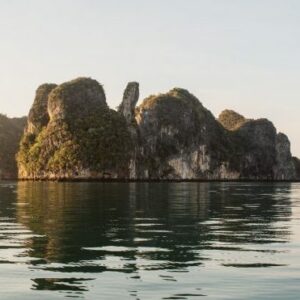After Mosul’s liberation, a monk’s view from the monastery

Overlooking the Nineveh Plains, fifteen miles from Mosul, a fortress-like monastery clings to the crags of Mount Alfaf. Since 363 AD the structure has watched over the land, through invasions and seasons of peace and, most recently, ISIS’s rule of terror. This is Mar Mattai, or Saint Matthew’s monastery, one of the most ancient in Christianity.
Mosul has been liberated but the front lines remain occupied. From the monastery walls, Shia militia outposts are visible every eighth of a mile.
In May of 2018, Father Yousif Ibrahim, a Syriac Orthodox monk and one of Mar Mattai’s last remaining inhabitants, greeted visitors with these words: “Welcome to our boiling times.”
Boiling, still, even now that ISIS has been driven out. Mosul’s liberation does not look like what you might expect: what was once Iraq’s second-largest city lies in ruins. Infrastructure and economy have evaporated; schools, hospitals, and businesses have been reduced to rubble. Mosul, once called “the pearl of northern Iraq,” is a battered shell of its former self. As of spring of 2018, more than 700,000 of the city’s residents remained displaced.

From their perch on Mount Alfaf, the monks of Mar Mattai watch Mosul struggle to rise. The most painful part for them is the erasure of Christianity from the region.
“No Christians have returned to Mosul,” Father Ibrahim said. “There is no security, from either side. We don’t trust anyone in our country. Not the government, not anyone.”
Iraqi Christians called the Nineveh Plains, which extend to the north and east of Mosul, home for nearly two thousand years. But over the past decade, millennia of church history were uprooted and destroyed. People fled their ancestral homeland as ISIS systematically massacred religious minorities. Once the land of Christianity, Iraq has lost nearly 90 percent of its Christian population since 2003, beginning with the U.S.-led invasion and worsening with the Islamic State, which all but annihilated Christianity.
“The problem is that our number before 2003 was more than one-and-a-half million,” said Father Ibrahim. “Now, all the Christians in all Iraq, they are not more than 150,000.”
Most believers, Father Ibrahim said, found refuge in the villages and town of Iraqi Kurdistan, an autonomous region in northern Iraq. His own family fled to the region in 2006, after his older brother was murdered in a calculated attempt to intimidate local Christians. But he stayed behind, prepared to die a martyr in the same manner as the first-century apostles.

In 2014, ISIS advanced on Mar Mattai. Mortar bombs exploded just short of the walls. Sure that they were about to be overrun, Father Ibrahim smuggled handwritten manuscripts, including a copy of the apostle Paul’s letters, from the monastery’s famed library to be hidden in an apartment in Iraqi Kurdistan. Then he and the other monks prepared to die. But by a miracle and Kurdish peshmerga forces, it didn’t come to that—the Kurdish military stopped ISIS’s advance just shy of the monastery walls.
For the next three years during Mosul’s occupation, Father Ibrahim lit a bonfire on top of those walls every Christmas and Easter. Residents of the occupied city could look toward Mount Alfaf and see flames burning against the darkness. This act of resistance was the monk’s message to terrorists, one that said: We are still here. We will not leave.
In many ways, Father Ibrahim’s message remains the same today. ISIS is gone, but Iraq faces ongoing threats—including the complete disappearance of a once-vibrant church. Priests encourage Christians to come home but people are unwilling to return.
“With the migration during ISIS period, no one from the government asked about us. No one visited us. The Kurdistan Regional Government supported us with all their energy, but we know that they are limited in their ability to help us.”

Religious minorities feel a deep mistrust that life will improve if they return, or that anyone will step forward to protect them in case of persecution.
“What we see is that no one cares about our fate or our destiny—that makes most of our people lose their hope for the future,” said Father Ibrahim. “Most Christians have decided to leave Iraq forever to look for a new future. Our suffering now is real.”
The monks of Mar Mattai are among the few believers who remain. Yet their presence exerts a powerful sense of hope over the wounded region. In the empty sanctuary, the monks conduct services in Aramaic, the language of Jesus. They are some of the last people on earth to speak it, keeping the words alive through prayer. They will be here waiting for whatever comes, whether it be the revival of Christianity or more persecution.
“For us—for me, at least, as a religion man, I know these are not new things,” Father Ibrahim said. “It’s a promise of our Lord, that if they persecute me, they will persecute you. So for us, it’s a reward from God. Most of the apostles ended their life with martyrdom. They were sharing Jesus with his blood.”


